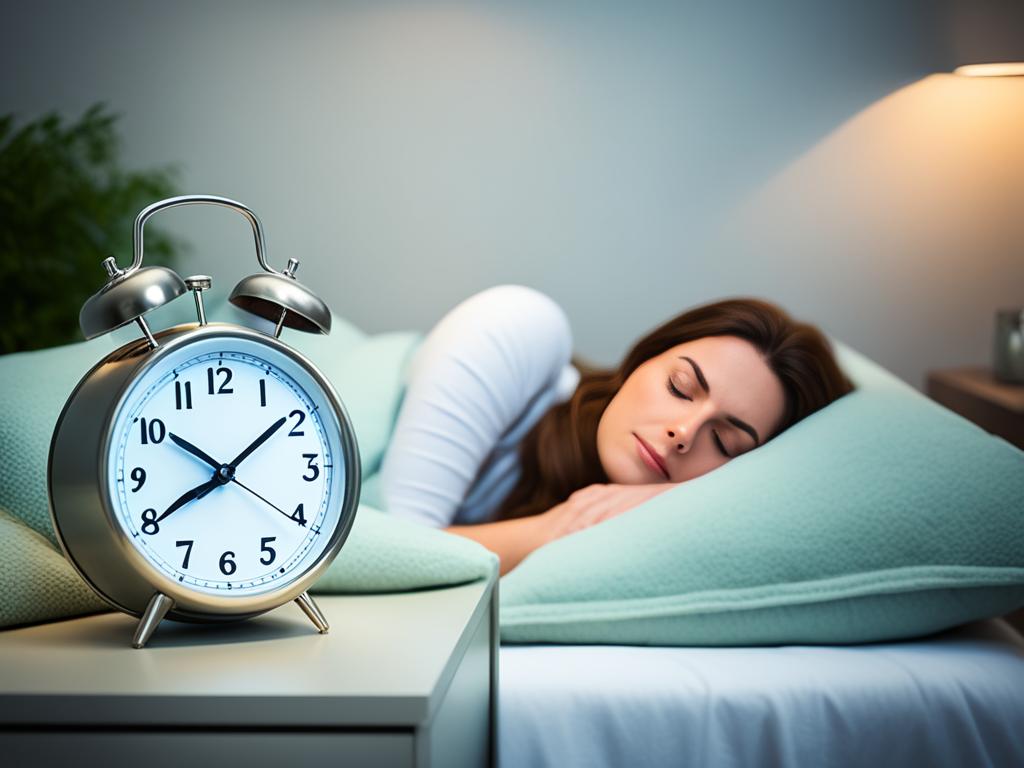Welcome to our article series on the science of sleep and its importance for a good night’s rest. Understanding the science behind sleep can help you improve your sleep habits and overall well-being. Sleep is a vital part of our daily lives, yet many people overlook its significance. By gaining insight into the science of sleep and implementing healthy habits, you can enjoy restful nights and wake up refreshed each morning.
In this series, we will delve into the various aspects of sleep, from its benefits to the impact of technology and creating the perfect sleep environment. We will also explore how sleep affects brain health and physical well-being. Additionally, we will provide practical tips for establishing healthy sleep habits that you can incorporate into your daily routine.
The Science of Sleep: Understanding Its Importance and Improving Your Habits
Key Takeaways:
- Sleep is crucial for overall health and well-being
- Understanding the science of sleep can help improve sleep habits
- Quality sleep has numerous benefits
- Technology can affect sleep patterns
- Creating a conducive sleep environment is essential
The Benefits of Quality Sleep
Getting a good night’s sleep is essential for your overall health and well-being. Quality sleep can provide numerous benefits, from improving your mood and cognitive function to boosting your immune system. In this section, we will explore the various advantages of prioritizing sleep and discuss how you can improve the quality of your sleep.
Common Sleep Disorders: Symptoms, Causes, and Treatments
Unfortunately, many individuals suffer from sleep disorders that can disrupt their sleep quality and daily functioning. Some common sleep disorders include insomnia, sleep apnea, restless leg syndrome, and narcolepsy. Recognizing the symptoms and understanding the causes of these conditions is crucial for seeking appropriate treatment.
Insomnia, for example, is characterized by difficulty falling asleep or staying asleep. It can be caused by various factors such as stress, anxiety, or certain medications. Treatments for insomnia can include lifestyle changes, behavioral therapy, or medication.
Similarly, sleep apnea is a sleep disorder where breathing repeatedly stops and starts during sleep. It is often caused by a physical obstruction in the airway. Continuous positive airway pressure (CPAP) therapy, oral appliances, and surgery are common treatments for sleep apnea.
Tips for Improving Sleep Quality
Improving the quality of your sleep starts with adopting healthy sleep habits and creating a conducive sleep environment. Here are some tips to help you get better sleep:
- Stick to a consistent sleep schedule, even on weekends.
- Create a relaxing bedtime routine to signal your body that it’s time to sleep.
- Avoid stimulants like caffeine and nicotine close to bedtime.
- Make your bedroom a comfortable and quiet space, free from distractions.
- Limit exposure to electronics, especially in the hour before bed.
Additionally, the link between diet, exercise, and sleep quality cannot be overlooked. Regular physical activity during the day can promote better sleep at night. Similarly, maintaining a balanced diet and avoiding heavy meals before bed can contribute to improved sleep quality.
The Link Between Diet, Exercise, and Sleep
A healthy diet that includes foods rich in sleep-promoting nutrients like tryptophan, magnesium, and vitamin B6 can aid in regulating your sleep-wake cycle. Incorporate foods such as turkey, nuts, seeds, bananas, and whole grains into your meals.
Exercise, on the other hand, not only helps tire your body but also reduces anxiety and stress, which can greatly impact your sleep. Aim for at least 30 minutes of moderate exercise, such as brisk walking or cycling, most days of the week.
By understanding the symptoms, causes, and available treatments for sleep disorders, as well as implementing healthy sleep habits and considering the link between diet, exercise, and sleep, you can significantly improve the quality of your sleep. Next, we will delve into the impact of technology on sleep and provide strategies to protect your sleep in a digital age.
The Impact of Technology on Sleep
In today’s digital age, technology plays a significant role in our lives. From smartphones to laptops, we are constantly surrounded by screens and connected to the online world. While technology has undoubtedly brought numerous benefits and conveniences, it can also have a detrimental impact on our sleep patterns.
Excessive screen time, especially before bedtime, can disrupt our natural sleep-wake cycle. The blue light emitted by electronic devices suppresses the production of melatonin, a hormone that regulates sleep. This can make it harder to fall asleep and negatively affect the overall quality of our rest.
It’s important to protect your sleep in a digital age and establish healthy technology habits. Here are some practical strategies:
- Set screen time limits: Establish specific periods during the day when you will limit your screen usage. This can help reduce exposure to stimulating content and allow your mind to unwind before bed.
- Create a technology-free bedtime routine: Design a calming routine before sleep that excludes the use of electronic devices. Engage in relaxing activities such as reading a book, taking a warm bath, or practicing mindfulness meditation.
- Turn off devices before bed: Power down your electronic devices at least 30 minutes before bedtime. This encourages your brain to prepare for sleep and reduces exposure to stimulating content and blue light.
- Use nighttime settings: Many devices offer features that reduce blue light emission, such as nighttime modes or blue light filters. Enable these settings to minimize the impact on your melatonin production.
- Create a technology-free sleep environment: Keep electronic devices out of your bedroom to eliminate distractions and promote a peaceful sleep environment. Invest in an alarm clock instead of relying on your phone for waking up.
By implementing these strategies, you can take proactive steps to protect your sleep in a digital age. Remember, quality sleep is essential for your overall well-being and productivity. Prioritizing restful nights contributes to improved physical and mental health, increased cognitive function, and enhanced quality of life.
Creating the Perfect Sleep Environment
Designing the perfect sleep environment is essential for achieving restful nights and maximizing the quality of your sleep. By optimizing factors such as lighting, noise, and comfort, you can create a conducive atmosphere that promotes deep and uninterrupted rest.
Lighting
Lighting plays a crucial role in regulating your body’s internal clock and promoting healthy sleep patterns. During the evening and nighttime, it’s important to minimize exposure to bright and harsh lights that can disrupt your natural sleep-wake cycle.
Consider using blackout curtains or blinds to block out external sources of light, such as street lamps or early morning sunlight. If you prefer a nightlight, opt for one with a soft, warm glow that mimics the natural dimming of the sun.
Noise
An ideal sleep environment should be quiet and free from disruptive noises that can disturb your sleep. If you live in a noisy area or have trouble eliminating background noise, consider using earplugs or a white noise machine to mask unwanted sounds.
White noise, such as the gentle hum of a fan or a soothing sound machine, can create a consistent and relaxing auditory environment that helps drown out external disturbances and promotes a calm and peaceful sleep atmosphere.
Comfort
Creating a comfortable sleep environment involves choosing the right mattress, pillows, and bedding that provide adequate support and promote optimal sleep posture. Your mattress should be firm enough to provide support for your spine while still cushioning pressure points.
Investing in high-quality pillows that properly align your neck and spine can help prevent discomfort and reduce the chances of waking up with pain in the morning. Additionally, choose bedding materials that are breathable and temperature-regulating, ensuring a comfortable sleeping temperature.
By implementing these tips for designing the perfect sleep environment, you can create a tranquil and soothing space that enhances the overall quality of your sleep. Remember, a restful night’s sleep is essential for your physical and mental well-being, so prioritize creating an optimal sleep environment that supports your sleep goals.
The Science of Sleep and Brain Health
Sleep plays a crucial role in not only your physical health but also your brain health. Scientific research has shown that getting adequate sleep is essential for optimal cognitive function, memory consolidation, and overall brain health.
During sleep, your brain goes through various processes that are vital for its proper functioning. One of these processes is memory consolidation, where the brain strengthens and stores new information, helping you retain what you’ve learned throughout the day.
Furthermore, sleep is essential for cognitive processes, such as attention, problem-solving, and decision-making. When you sleep, your brain organizes and processes information, allowing you to think clearly and make better judgments when you wake up.
Did you know? Lack of sleep can impair your concentration, focus, and overall cognitive performance. It can also negatively affect your mood, leaving you irritable and more prone to stress and anxiety.
Quality sleep is like a “reset” for your brain. It not only helps you retain information and improve cognitive function but also promotes emotional well-being and mental clarity throughout the day.
Additionally, sleep deprivation has been linked to an increased risk of developing neurological disorders, including Alzheimer’s disease and other forms of dementia. Chronic sleep problems may contribute to the buildup of harmful proteins in the brain, leading to cognitive decline and neurodegenerative diseases.
So, how can you prioritize sleep to improve your brain health? It starts with practicing good sleep habits, such as maintaining a consistent sleep schedule and creating a relaxing bedtime routine. Avoiding electronic devices before bed and creating a sleep-friendly environment can also help promote better sleep quality.
Now let’s take a closer look at the science behind sleep and how it impacts your physical health in the next section.
The Role of Sleep in Physical Health
Getting enough quality sleep is not only essential for your overall well-being but also plays a crucial role in maintaining good physical health. Adequate sleep is responsible for promoting various aspects of your body’s functioning, from immune system support to hormone regulation, and even the prevention of chronic health conditions.
One of the key ways in which sleep impacts physical health is through its influence on the immune system. During sleep, your body produces and releases infection-fighting proteins called cytokines. These cytokines help to protect your body against illness and infection. Lack of sleep compromises the production of these proteins, making you more susceptible to infections and reducing your body’s ability to fight off viruses and bacteria.
Hormone regulation is another crucial aspect of sleep’s impact on physical health. Sleep plays a vital role in regulating hormone levels, such as those responsible for appetite control, metabolism, and growth. Insufficient sleep can disrupt these hormone levels, leading to an increased risk of weight gain, diabetes, and other metabolic disorders.
“Sleep is the golden chain that ties health and our bodies together.” – Thomas Dekker
Chronic health conditions, including cardiovascular diseases, hypertension, and even certain types of cancer, have been linked to poor sleep habits. Research shows that individuals who consistently experience inadequate sleep have a higher risk of developing these conditions. Sleep deprivation can lead to increased inflammation in the body, disrupt normal cellular functioning, and negatively impact overall cardiovascular health.
The Link Between Sleep and Exercise
Regular exercise plays a vital role in maintaining physical health, and adequate sleep complements these efforts. Quality sleep helps to optimize athletic performance by aiding in muscle recovery, repair, and growth. While you sleep, your body releases growth hormones that stimulate tissue repair, helping your muscles recover from the wear and tear caused by physical activity.
Moreover, sleep has a significant impact on exercise capacity and endurance. Insufficient sleep can lead to decreased muscle strength, impaired coordination, and reduced overall performance during workouts. Getting enough restful sleep allows your body to replenish energy stores, optimize oxygen utilization, and enhance overall physical performance.
| Physical Health Benefits of Sleep | Effects of Sleep Deprivation |
|---|---|
| Enhanced immune function | Increased susceptibility to illnesses and infections |
| Improved hormone regulation | Increased risk of weight gain, metabolic disorders |
| Reduced risk of chronic health conditions | Higher likelihood of cardiovascular diseases, hypertension, and certain cancers |
| Optimized muscle recovery and growth | Decreased muscle strength and impaired coordination |
| Enhanced exercise capacity and endurance | Reduced physical performance during workouts |
Ensuring you prioritize sleep and establish healthy sleep habits is vital for maintaining optimal physical health. By understanding the importance of sleep, you can take proactive steps to improve your sleep quality and duration, allowing your body to benefit from the restorative power of sleep.
Tips for Establishing Healthy Sleep Habits
Establishing healthy sleep habits is essential for ensuring restful nights and promoting overall well-being. By adopting these tips for improving sleep quality, you can optimize your sleep routine and wake up feeling refreshed and energized.
Create a Consistent Sleep Schedule
Set a regular sleep schedule by going to bed and waking up at the same time every day, even on weekends. This helps regulate your body’s internal clock and improves sleep quality over time. Avoid drastic changes in your sleep schedule, as this can disrupt your natural sleep-wake cycle.
Create a Relaxing Bedtime Routine
Incorporate activities that promote relaxation into your bedtime routine. Engage in calming activities such as reading a book, taking a warm bath, or practicing relaxation techniques like deep breathing or meditation. This signals to your body that it’s time to unwind and prepare for sleep.
Manage Stress During the Day
Stress and anxiety can interfere with your ability to fall asleep and stay asleep. Try implementing stress management techniques throughout the day, such as exercise, journaling, or talking to a trusted friend or therapist. Establishing healthy coping mechanisms can help reduce stress levels and improve sleep quality.
Create a Sleep-Friendly Environment
Design your bedroom to create an optimal sleep environment. Keep the room dark, quiet, and at a cool temperature. Consider using blackout curtains, earplugs, or a white noise machine to minimize distractions and create a peaceful atmosphere conducive to sleep.
Conclusion
Congratulations on completing this comprehensive exploration of the science of sleep. Throughout this article, we have examined the importance of understanding the intricacies of sleep and how it can significantly impact your overall health and well-being. By incorporating the knowledge gained from this discussion, you can improve your sleep habits and enjoy the benefits of a restful night’s sleep.
Understanding the benefits of quality sleep is the first step towards optimizing your rest. We have explored common sleep disorders and their symptoms, causes, and available treatments. Additionally, we have provided practical tips for improving sleep quality through adjustments in diet and exercise routines.
The impact of technology on sleep cannot be ignored in our digital age. We have discussed the potential negative effects of excessive screen time and offered strategies to protect your sleep and establish healthy boundaries with technology.
Creating the perfect sleep environment is another vital aspect of optimizing your sleep. By considering factors such as lighting, noise, and comfort, you can design a sleep-friendly space that promotes relaxation and restfulness.
Furthermore, we have delved into the fascinating connection between sleep and brain health, as well as the crucial role sleep plays in promoting physical well-being. Adequate sleep is vital for cognitive function, memory consolidation, immune function, hormone regulation, and the prevention of chronic health conditions.
Finally, we have provided practical tips for establishing healthy sleep habits. From maintaining a consistent sleep schedule to developing a relaxing bedtime routine and managing stress, these strategies can help you optimize sleep quality and achieve better overall wellness.
By incorporating the science of sleep into your daily routine, you can unlock the benefits of a good night’s rest. Remember, it’s not just about the quantity of sleep but also the quality. Prioritize your sleep and reap the rewards of improved rest, energy, and well-being.







